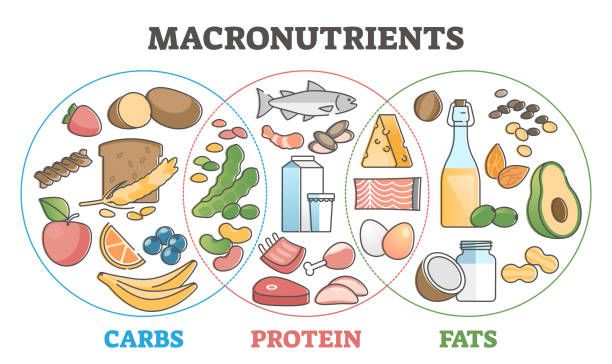
In order to maintain a healthy and balanced diet, it is important to understand and include macronutrients in
the right proportions. Macronutrients are essential nutrients that our bodies require in large amounts to
function optimally. The three main macronutrients are protein, carbohydrates, and fats. Balancing these
macronutrients in our daily food intake is crucial for overall well-being and achieving our health goals.
Protein
Proteins are the building blocks of our body. They are vital for growth, repair, and maintenance of tissues,
muscles, and organs. Protein is made up of amino acids, which are responsible for various functions within the
body. Including sufficient protein in our diet promotes lean muscle development, supports a healthy immune
system, and provides a feeling of satiety.
Good sources of protein include lean meats, poultry, fish, tofu, lentils, beans, dairy products, and eggs. It is
recommended to consume about 0.8 grams of protein per kilogram of body weight. However, individual protein
requirements may vary based on factors such as activity level, age, and gender. Adding protein-rich foods to
every meal and snack can help ensure adequate intake.
Carbohydrates
Carbohydrates are the primary source of energy for our bodies. They are broken down into glucose, which fuels
our brain and muscles. There are two types of carbohydrates: simple carbohydrates and complex carbohydrates.
While simple carbohydrates provide quick energy, complex carbohydrates provide sustained energy and are rich in
fiber, vitamins, and minerals.
Good sources of carbohydrates include whole grains, fruits, vegetables, legumes, and low-fat dairy products.
Opt for whole grain options such as whole wheat bread, brown rice, and oats, as they are higher in fiber and
essential nutrients. It is recommended to consume 45-65% of our daily caloric intake from carbohydrates. Focus
on including a variety of colorful fruits, vegetables, and whole grains in your diet to ensure a well-rounded
carbohydrate intake.
Fats
Fats often have a negative connotation when it comes to nutrition, but they are an important macronutrient that
our bodies need. Healthy fats provide energy, support cell growth and function, help absorb fat-soluble vitamins,
and act as a cushion for our organs. There are different types of fats, including saturated fats, trans fats,
monounsaturated fats, and polyunsaturated fats.
Good sources of healthy fats include avocados, nuts, seeds, olive oil, fatty fish, and nut butters. It is
recommended to consume around 20-35% of our daily caloric intake from fats. However, it is important to
prioritize unsaturated fats over saturated and trans fats. Incorporating a variety of healthy fats into our
diet can promote heart health, brain function, and overall well-being.
Striking the Right Balance
Now that we understand the importance of each macronutrient, it is crucial to strike the right balance between
protein, carbohydrates, and fats. The ideal diet for an individual depends on various factors, including age,
gender, activity level, and specific goals.
One popular approach to macronutrient balancing is the “40-30-30” rule, where 40% of the daily caloric intake
comes from carbohydrates, 30% from protein, and 30% from fats. However, it is important to note that this ratio
can vary depending on personal preferences and dietary needs. Consulting a registered dietitian or healthcare
professional can help determine an individualized macronutrient distribution.
Additionally, it is important to focus on the quality of the macronutrients consumed rather than solely
quantities. Prioritizing whole, unprocessed foods over refined and processed options is crucial. This ensures
that our bodies receive the necessary nutrients and reduces the intake of additives, preservatives, and added
sugars.
Conclusion
Balancing macronutrients, namely protein, carbohydrates, and fats, is essential for maintaining a healthy and
balanced diet. Each macronutrient plays a vital role in supporting our body’s functions and overall health.
Understanding the sources and recommended daily intake of these macronutrients allows us to make informed
choices and create a well-rounded meal plan.
Remember, no single approach fits all, and it is important to personalize macronutrient distribution based on
individual needs and goals. Prioritizing nutritious, whole foods and consulting with a healthcare professional
can help ensure the right balance of macronutrients and promote optimal health.

